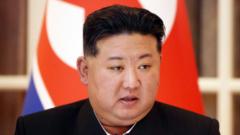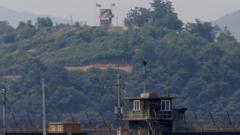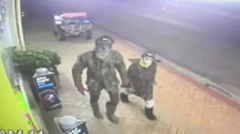Yoon Suk Yeol, South Korea's former president who was impeached last year, has been rearrested over his controversial martial law declaration. The court's decision highlights ongoing tensions and legal challenges surrounding his administration's actions.
Former South Korean President Yoon Suk Yeol Rearrested Amid Ongoing Legal Battles

Former South Korean President Yoon Suk Yeol Rearrested Amid Ongoing Legal Battles
The ex-president faces serious allegations following a failed martial law attempt that sparked political upheaval in South Korea, raising questions about accountability and democracy.
South Korea's former president Yoon Suk Yeol has been rearrested in connection with last year's unsuccessful attempt to impose martial law, an event that sent shockwaves through the nation. A senior judge at Seoul's Central District Court issued an arrest warrant for Yoon citing potential evidence tampering, underscoring growing concerns about accountability in political leadership.
Yoon Suk Yeol's attempt at declaring martial law in December, which lasted only six hours, led to his impeachment in April of this year. During a lengthy seven-hour hearing, a special counsel team presented their case for the arrest, listing key charges against him, including the alleged violation of cabinet members' rights by omitting some from crucial meetings prior to his declaration. After initially attending the hearing with his legal team to refute the allegations, he was subsequently taken to Seoul Detention Center as the court deliberated on the warrant.
This incident marks a significant moment in South Korean history as Yoon is the first sitting president to have been arrested. His initial arrest in January was met with public protests, including barricades set up by law enforcement to detain him at his home in central Seoul. Following his release two months later on technical grounds, he is now facing a trial that could result in severe penalties, including life imprisonment or even the death penalty if convicted.
Reports indicate that prosecutors have gathered evidence suggesting that Yoon directed military drones to be dispatched over North Korea to incite a response that would validate his martial law decision. Other top officials in his administration are also under investigation for related charges such as insurrection and abuse of power. Interestingly, insurrection is one of the few crimes for which a South Korean president does not have immunity; however, with Yoon no longer in office, he is vulnerable to a variety of legal actions.
The political landscape has shifted dramatically in South Korea since Yoon's departure, with the newly elected president Lee Jae-myung taking office in June. Lee, who promised to fortify democracy following the political crisis, appointed a special counsel team specifically to probe into Yoon's imposition of martial law, amidst a swath of other allegations surrounding his former administration. This situation reflects a broader narrative of a polarized nation grappling with issues of governance and rule of law in the wake of recent events.

















